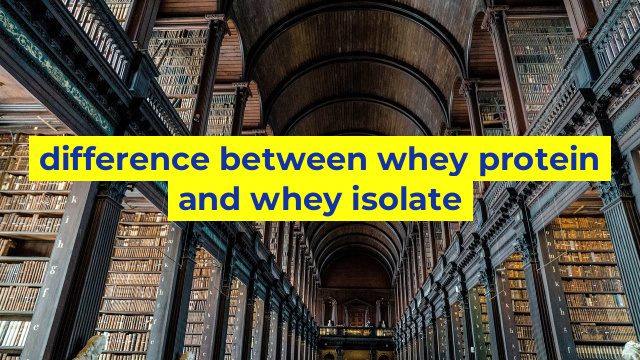Understanding the Difference Between Whey Protein and Whey Isolate
What is Whey Protein?
Whey protein is a popular dietary supplement often taken by fitness enthusiasts and athletes to enhance muscle growth and recovery. It is a by-product of cheese production, extracted from milk that has been curdled and strained.
Whey protein is rich in amino acids and contains all the essential amino acids needed for muscle growth and repair. It is also easily digestible and absorbed by the body quickly, making it an excellent post-workout supplement.
What is Whey Isolate?
Whey isolate is a form of whey protein that has undergone further processing to remove the lactose and fat, resulting in a purer form of protein. It contains a higher percentage of protein per serving and is often considered a premium form of protein.
Whey isolate is also a complete protein source, rich in essential amino acids that the body cannot produce on its own. It is an excellent choice for those with lactose intolerance or those watching their calorie and fat intake.
Key Differences Between Whey Protein and Whey Isolate
The main difference between whey protein and whey isolate is the processing. Whey isolate undergoes further filtration to remove lactose and fat, resulting in a protein powder that is at least 90% pure protein, higher than the 80% or so found in regular whey protein.
Whey isolate is also more expensive than regular whey protein due to the additional processing it undergoes. However, the higher protein content and purity make it an excellent choice for those looking to increase muscle mass and recovery without the added carbs and fats.
Which is Right for You?
Deciding whether whey protein or whey isolate is right for you depends on your fitness goals and dietary needs. If you are looking to increase muscle mass and speed up recovery time, either option can work. However, if you are lactose intolerant or have a sensitivity to dairy, whey isolate may be the better option.
The purer form of protein found in whey isolate also makes it a great choice for those looking to keep a low-fat, low-carb diet. It all comes down to personal preference, budget, and dietary needs.
In conclusion, both whey protein and whey isolate are excellent sources of protein for muscle growth and recovery. Whey isolate offers a higher protein content and purity, making it suitable for those looking to limit their carb and fat intake. Ultimately, the choice between the two depends on your preferences and dietary requirements.
Table difference between whey protein and whey isolate
| Parameter | Whey Protein | Whey Isolate |
|---|---|---|
| Protein Content | Contains 70-80% protein | Contains 90% or more protein |
| Processing Method | Less filtered form of whey | More refined form of whey |
| Carbohydrate Content | Contains more lactose and other carbohydrates | Contains very low lactose and carbohydrate content |
| Fat Content | Contains low levels of fat | Contains negligible levels of fat |
| Availability | More widely available and cheaper than whey isolate | Relatively expensive compared to whey protein |
